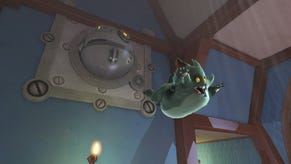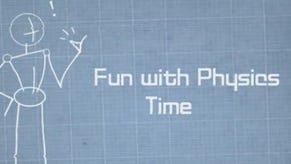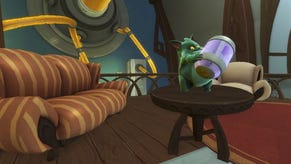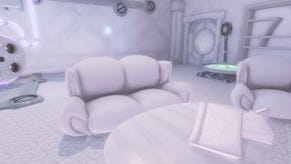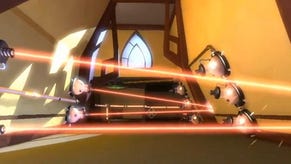Hands On: Quantum Conundrum
A portal to a new dimension
On some level, your brain knows the right place to head toward when playing Quantum Conundrum. Created by the co-creator of Portal, despite certainly being a different game, the puzzles seem to stimulate that same lateral place that requires you enter into the reinterpretation of physics that inhabits the gaming world. Except this time, it's a lot fluffier.
That's true in every sense. I was struck straight away by how friendly Quantum Conundrum is, a bright, cheerful game, despite its puzzles being peculiarly deadly. It's a rather twisted uncle who fills his mansion with puzzles that can kill a person, and a dangerous place for a twelve year old boy to be exploring.
But beyond the game's propensity to chop you up in a propeller, or let you fall into a chasm, it's a remarkably family-friendly experience. Death is a fade to black, before being plopped right back where you were before you messed up. And progress takes place in a world packed with sofas, daft paintings, and strange furry blue creatures.
The hook, as has been well established in a slew of footage over the last year, is a special glove - the Interdimensional Shift Device - that allows you to switch dimensions. With the correct battery inserted into a room's receptacle, you're able to flip back and forth as you wish, letting you approach puzzles with constantly changing physical rules.
Until now we've seen an awful lot of the Fluffy dimension and not a lot else. Thankfully, last week I was able to sit down and play the levels that will eventually be released as the game's demo, and see a bit more of what it has to offer. Revealed alongside Fluffy are the Heavy dimension, which rather predictably makes everything incredibly heavy, and another that slows down time, and one not in the demo that reverses gravity. There's at least one more that's yet to be unveiled, but rewinding time seems a fair guess.
The initial challenges are very simple. As with Portal, you're not given the glove straight away, but rather the dimension changes happen automatically around you, letting you get used to the concept. A safe, naturally too heavy to lift, is easily thrown around when turned to pink fur, and dumping it one large switches makes for obvious solutions.
Later it introduces the options available from switching back and forth yourself, and you've likely seen the footage of fluffy safes being thrown toward large windows, before being switched back to the regular world as they arc, letting them smash the glass. It's a very neat concept. By the time you have Heavy added into your options, you're able to take advantage of both and manipulate the environment accordingly.
The demo is brief, so it was hard to get a good feel for the variety on offer, and being early stages it was impossible to know if it was going to get tough enough to be properly interesting. However, one puzzle was really splendid. Four stacks of four cardboard boxes descend from slots in the ceiling, followed by a laser that sweeps back and forth across them, destroying them as it comes in contact. But with the Heavy option available, you're able to switch it on and off to cause the laser to pass over some and destroy others, forming yourself a crude staircase. And after being told I had completed it faster than anyone before, I was able to smugly enjoy watching others struggle and fail at it after. I am best. I am definitely better than Valve's Jay Pinkerton, who sucked at it. That is the takeaway message here.
The demo then jumps ahead to a later part of the game, where time manipulation is being introduced. Once again it happens to you, rather than being something your in control of yet, which makes for some platform-like leaping with careful timing, as you ride on the backs of floating couches and tables, through the ludicrously shaped corridors and rooms of the mansion, jumping between the blades of fans before they speed back up.
At one point, making a jump to a floating coach, I noticed the game giving me a slight tug backward to ensure my landing. How people react to occasionally noticing they're being helped like that will be interesting to see. I was grateful for it, as judging the jump distance wasn't something I could have exactly known first time, and repeating it would have been tiresome. I'd done the right thing, and the game acknowledged that - that works for me.
It's very clear as you play that the game has been through the same intensive playtesting iterative process that Swift learned at Valve. At moments when you get stuck, the game acknowledges that and prompts. It doesn't give the game away, and more often just seems to gently mock, but prevents tiresomely wandering in circles. Sarcastic reactions to my mistakes are something I approve of. And in the game. Of course, this also carries the danger of making a game too easy to get through, robbing the player of the pleasure of being completely stuck - how that actually works out won't be known until we get our hands on a copy of the whole thing.
The cutesy appearance, and lack of a sinister threat, will I think put off some who seek a darker tone to games. But as Swift explains in an interview coming along in the next hour, this was a deliberate choice, to make the game something playable by adults and kids, possibly together. It's an intriguing prospect. Right now, it's far too early to say if it's all going to come together. The pedigree is there, and the ingredients are certainly in place. Here's hoping.






